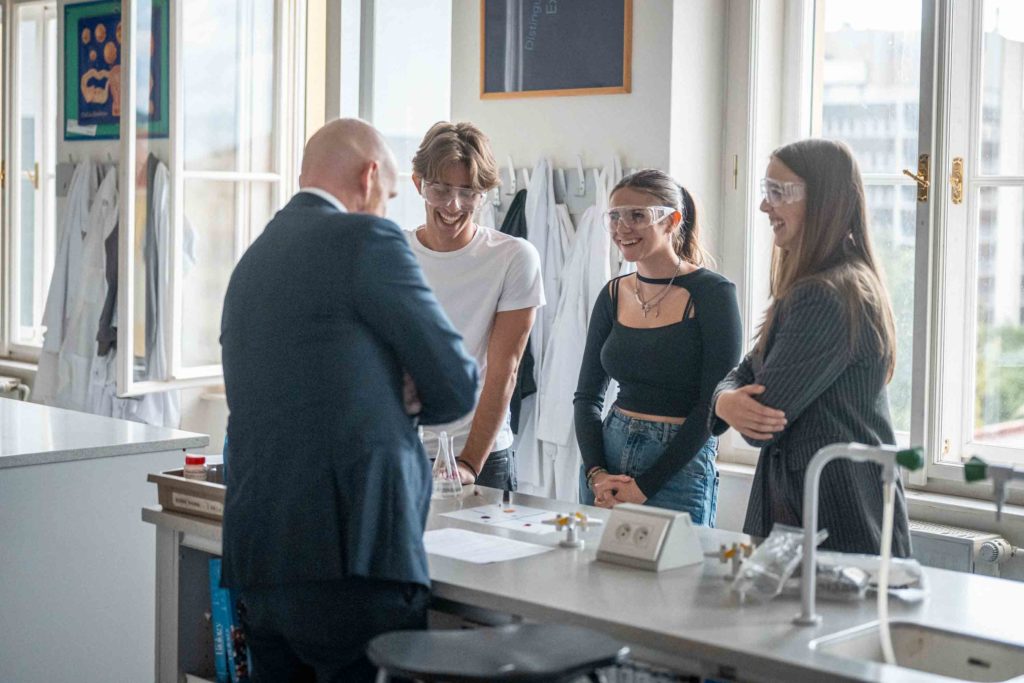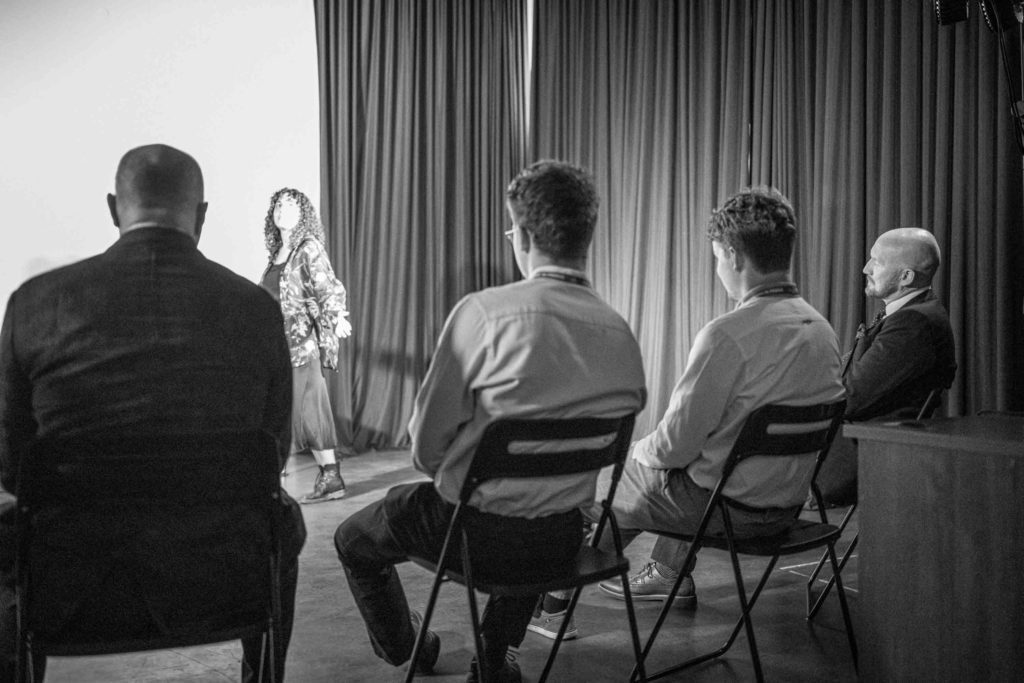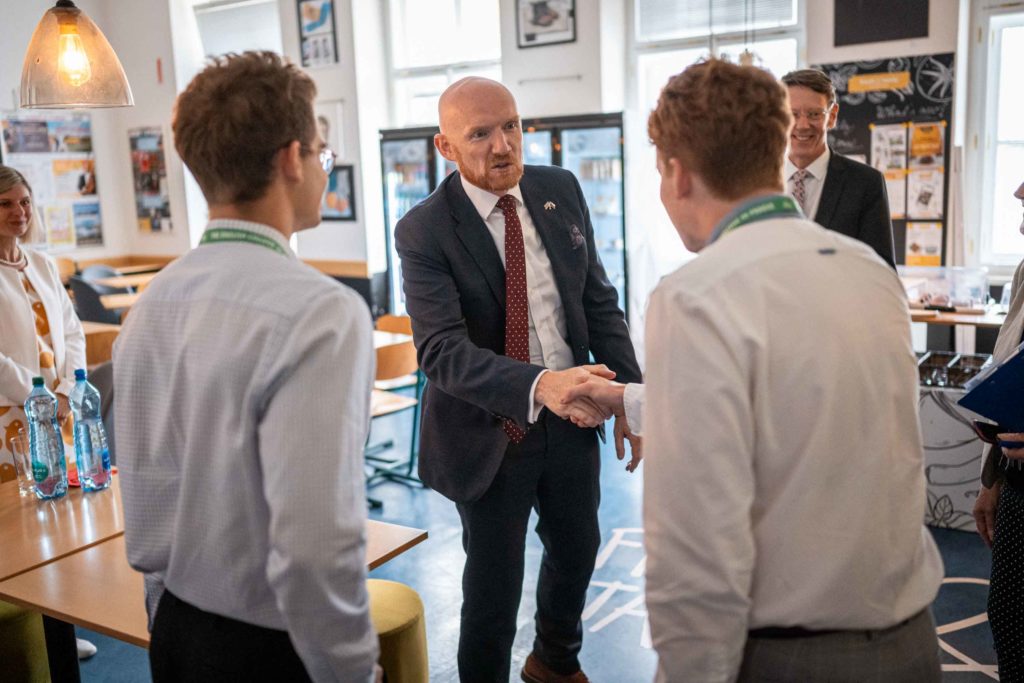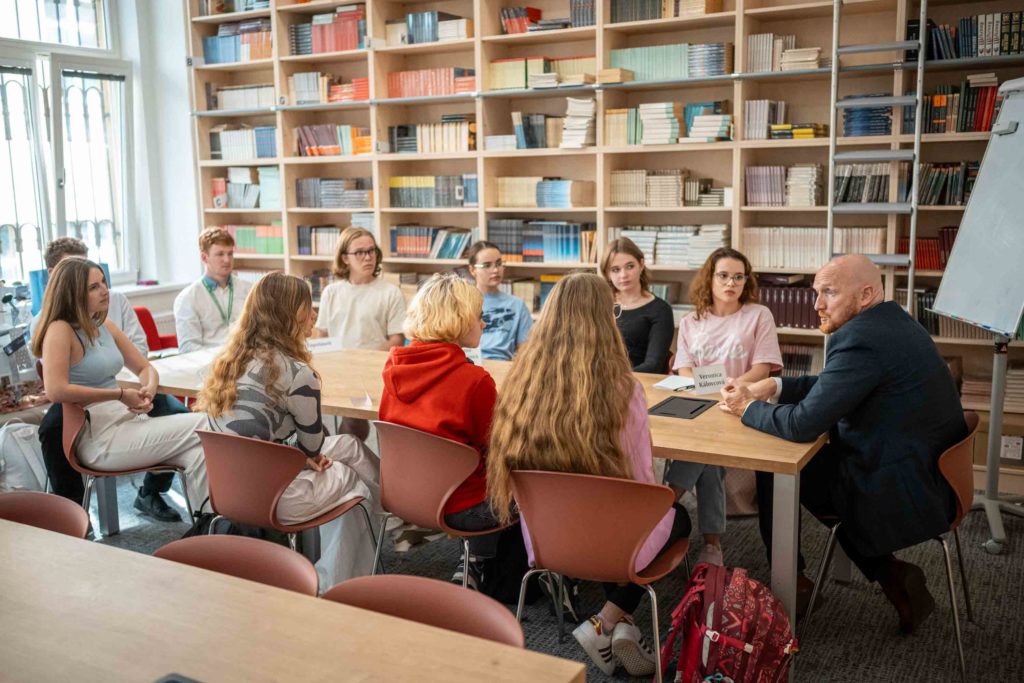
The English College has always had close ties with the British Embassy so it was a pleasure to welcome the UK Ambassador, Matt Field, into school last week. Here he is with three of our IB Chemistry students who are showing him an experiment.
Student Ambassadors
A school’s most important ambassadors are its students and so ECP students were centre stage of the visit, both metaphorically and literally. Karolína Mammadli and Loreta Votavová provided a dramatic interlude. Karolína performed a monologue from Shakespeare’s Titus Andronicus and Loreta described an extract from Terra House’s winning entry at this year’s Cultural Olympiad, a chilling horror film.

Dmitry Cheremisin and Kryštof Folbrecht, who graduated from the College this summer, returned to act as the Ambassador’s guides. Kryštof is going to study PPE at Salzburg University and Dmitry will be studying Economics at the University of Cambridge.

Model United Nations Conference
Students wanted the Ambassador to hear about their plans for a MUN Conference in November. The purpose behind MUN is to show students what the United Nations does. It also encourages them to research and debate the important global issues faced by countries around the world.
The theme of ECP’s MUN conference is global peace. Our students believe that peace not only between countries and societies, but also between individual peoples is vital. It is necessary to create supportive and passionate societies that will come together to solve world problems.
Careers Advice
The English College places great importance on providing students with access to information about careers. So we were very grateful to Matt Field for agreeing to talk to a group of our aspiring diplomats. He told them about his own recruitment into the Foreign & Commonwealth Office. This included a language aptitude test that involved having to quickly learn twenty words in a language previously unknown to him and having to recall them later. He also had to take part in an exercise to test candidates’ soft skills in negotiations.

Brexit
Amongst the subjects raised with him by students was how diplomats deal with the situation when their own views do not coincide with their Government’s policies. He talked about the tricky problem faced by British diplomats around the world as a result of the 2016 Brexit referendum. This eventually led to the UK leaving the European Union four years later. It is no secret that many British diplomats personally regretted the decision. But, as Matt Field explained, democracy had spoken and given that it was the will of the British people, it was the duty of the country’s diplomats to explain it around the world.
That doesn’t mean that diplomats can’t have personal views, he explained. They are even allowed to be members of a political party. But if they want to campaign on political issues, then they must leave the service and become politicians. One of the most important non-governmental jobs in the UK Parliament – chairing the Foreign Affairs Select Committee – is held by Member of Parliament Alicia Kearns who had previously served in the Foreign Office, but who resigned in order to follow a political career.
The Ambassador also told students that their country’s own diplomatic service is not the only route to a career in international relations. There are many institutions that employ foreign affairs specialists. These include international non-governmental organisations and Matt Field worked for Oxfam before becoming a diplomat. There are also multinational corporations and international institutions such as the United Nations, the World Bank and the World Health Organisation.
ECP Graduate Diplomats
The English College is developing a reputation for educating future diplomats. As well as Jan Brunner (1999), who is currently Deputy Head of Mission at the Czech Embassy in Vienna, we now have our first Ambassador, Lucie Samcová-Hall Allen (2000) is Head of the European Union Delegation to Iceland. Other ECP diplomats include Tomáš Pospíšil (1999), DHM of the EU Delegation to Uruguay and Tomáš Minárik (2000), Acting Director, Department of International Cooperation and the EU at NÚKIB (National Cyber and Information Security Agency). And although technically not a diplomat, Daniel Braun (1998), is Head of Cabinet of the Vice President for Values and Transparency at the European Commission.
It will be interesting to look back in ten years to see which members of this group of potential diplomats amongst our current students were able to follow their dream and become diplomats.
Early Days of the College
ECP’s connections with the British Embassy go back a long way. Back in February 1990, the then British Ambassador, Laurence O’Keeffe, was present at a meeting at Prague Castle between the new President Václav Havel and UK Foreign Office Minister, William Waldegrave. This is when the idea of recreating the former Prague British Grammar School – on which the ECP was based – was first discussed. ECP Founder Governor, Ann Lewis, who was also present at the meeting with the President, remembers it well. She recalls that the President was enthusiastic about the idea although, as she says in the book Leaves and Branches, setting out the history of the first 20 years of the English College “none of those present on the UK side had ever heard of the old English Grammar School, but we were keen to pursue the idea.”
Since then, several Deputy Ambassadors have served as Governors of the English College. These include the current Chairman, Denis Keefe, who was Deputy Head of Mission from 1998 to 2002. He is a former colleague of Matt Field in what is now called the Foreign, Commonwealth & Development Office. He served as UK Ambassador to Serbia at the same time that Matt Field was UK Ambassador to Bosnia Herzegovina.